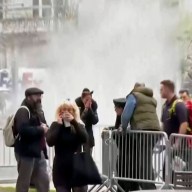OTTAWA – The judge at Momin Khawaja’s trial will hear more testimony from the Crown’s star witness after the defence argued prosecutors are trying to exaggerate the defendant’s supposed terrorist connections.
Ontario Superior Court Justice Douglas Rutherford, who is trying the case without a jury, ruled Tuesday that the Crown can continue on the course it has set – at least for now.
Defence lawyer Lawrence Greenspon had suggested the Crown wants to smuggle in evidence of other conspiracies, undertaken by other people, that have nothing to do with the charges on which his client is standing trial.
“Let’s stop mixing apples and alligators,” Greenspon argued.
Khawaja faces seven counts of terrorism-related offences that allege he participated in a failed plot by Islamic extremists to bomb a nightclub, shopping centre and electrical-and gas-distribution facilities in Britain.
But much of the early testimony by Mohammed Babar has consisted of depictions of unrelated activities to which Khawaja has not been personally linked.
The apparent aim, said Greenspon, is to “make the U.K. bomb plot much larger and encompass everything.”
Crown attorney Bill Boutzouvis retorted that only some of the charges against Khawaja are pinned strictly on the 2004 conspiracy. There are also broader charges of helping to finance terrorism and making a house owned by his family in Pakistan available as a terrorist base.
The legal point at issue was whether key portions of Babar’s testimony should be allowed as evidence, or whether they should be barred as hearsay.
In ruling the testimony can proceed, Rutherford acknowledged that he’s had some trouble following the twists and turns in the first two days of testimony.
“At this early stage I am quite unable to discern the scope and extent of the criminal enterprise,” said the judge. He expressed hope, however, that all will become clear “in the fullness of time” and allowed the questioning of Babar to continue.
Rutherford reserved the right to decide at a later point on the relevance of the evidence, noting that it could be the end of the trial before he has a full picture of events.
Babar, a one-time al-Qaida operative turned police informer, began his testimony Monday with vivid descriptions of a variety of terrorist plots in Pakistan and Britain, including a failed plan to assassinate Pakistani President Purvez Musharraf in 2002.
His early comments bearing directly on Khawaja, however, were limited.
He has told the court that Khawaja wanted to go to Afghanistan to fight western forces in 2002, but never made it because the Taliban were in disarray at the time and trying to regroup.
Babar has also indicated that Khawaja made a house in Rawalpindi available in 2003 for the use of other “brothers” in the jihad movement.
In addition, Babar gave detailed accounts Tuesday of his contacts with three men involved in the British end of the 2004 bomb plot that sparked the charges against Khawaja. All three had been to Pakistan and received explosives training there, he said.
A London court convicted five British Muslims last year of conspiring to bomb targets in and around the city. Khawaja was named as a co-conspirator in that case but was not tried in Britain.
Instead, he was arrested and charged in Canada after the RCMP raided his home and seized electronic components for a bomb detonator, half a dozen firearms, ammunition and books on terror tactics.
















